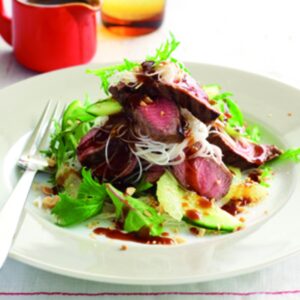
Your guide to the different types of oils available, their health benefits, and what they are best used for.
Avocado oil
- High in beneficial monounsaturated fats
- A very high smoke point (270°C) means it’s suitable for all types of cooking
- A flavoursome oil also suitable for salads
Canola oil
- High in beneficial monounsaturated fats and containing omega-3 (ALA)
- Suitable for cooking up to 200°C
- With its subtle flavour, this is the pick for an economical, everyday oil
Flaxseed oil
- Exceptionally high in beneficial omega-3 (ALA) with some omega-6
- Not suitable for cooking as it has a very low smoke point
- Subtle taste makes it a healthy alternative for salads
Hempseed oil
- Has a ratio of 3:1 omega-6 to omega-3
- Smoke point around 165°C so not suitable for high-heat cooking
- Strong herby flavour suitable for salads
Macadamia nut oil
- Exceptionally high in beneficial monounsaturated fats
- Can be used for cooking up to 200°C
- Light distinctive nutty flavour makes it a healthy alternative for salads
Olive oil
- High in beneficial monounsaturated fats, olive oil is heart-healthy
- Choose extra virgin olive oil for its flavour and high level of antioxidants
- Smoke point around 180-210°C
- A flavoursome oil for salads
Peanut and sesame oil
- High in both monounsaturated and polyunsaturated (omega-6) fats
- Smoke points around 210-220°C
- Generally used only where their distinctive flavours are required
Rice bran oil
- High in beneficial monounsaturated fats, rice bran oil has also been shown to lower cholesterol
- With a mild flavour and high smoke point, this oil is suitable for both cooking or salads and it’s economical, too
Soy oil
- The most common oilseed produced in the world
- Its versatility has made it popular (smoke point over 250°C) but with a
high omega-6 content, even though it does contain some omega-3 (ALA)
you’re better to choose something else
Sunflower and safflower oils
- Like soy oil, these are very versatile with a high smoke point
- Very high omega-6 content with no omega-3
- Try canola or rice bran oil instead
© Healthy Food GuideAll rights reservedReproduction without permission prohibited
www.healthyfood.com
www.healthyfood.com











